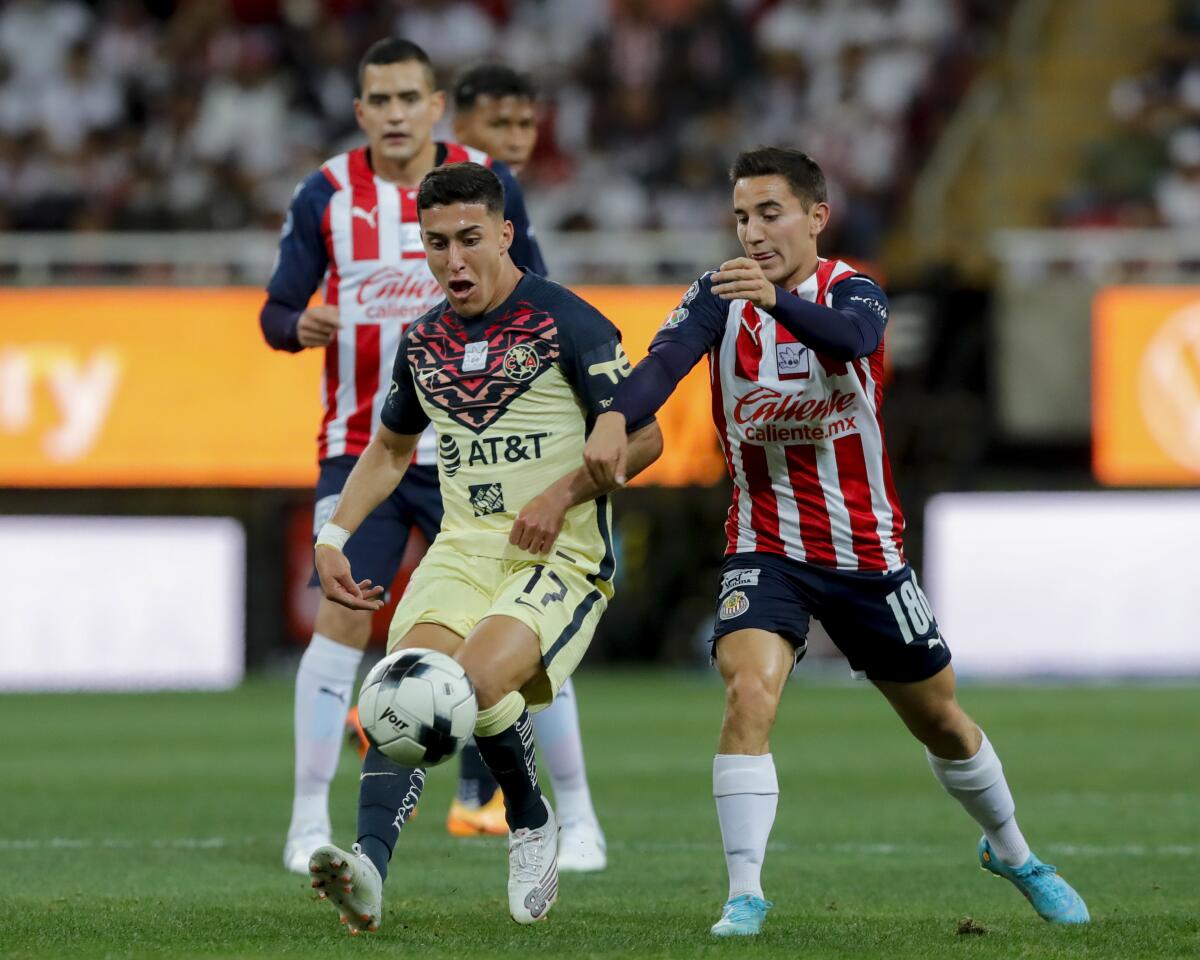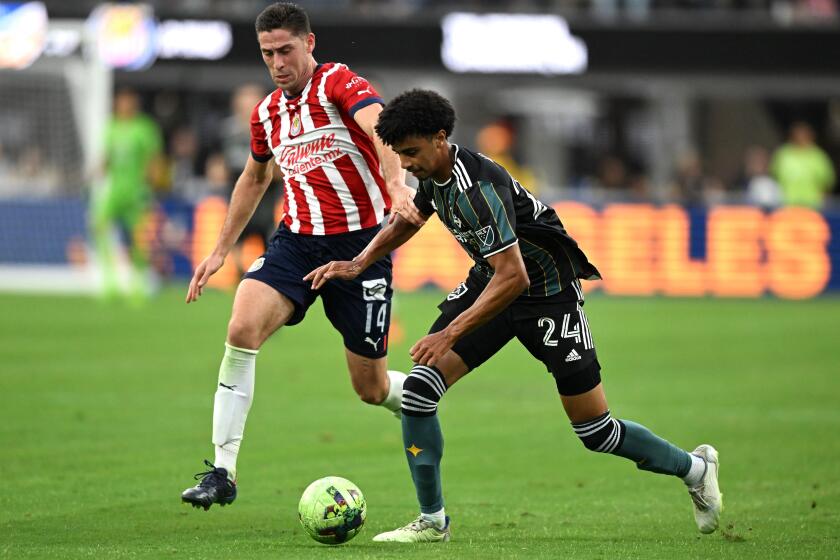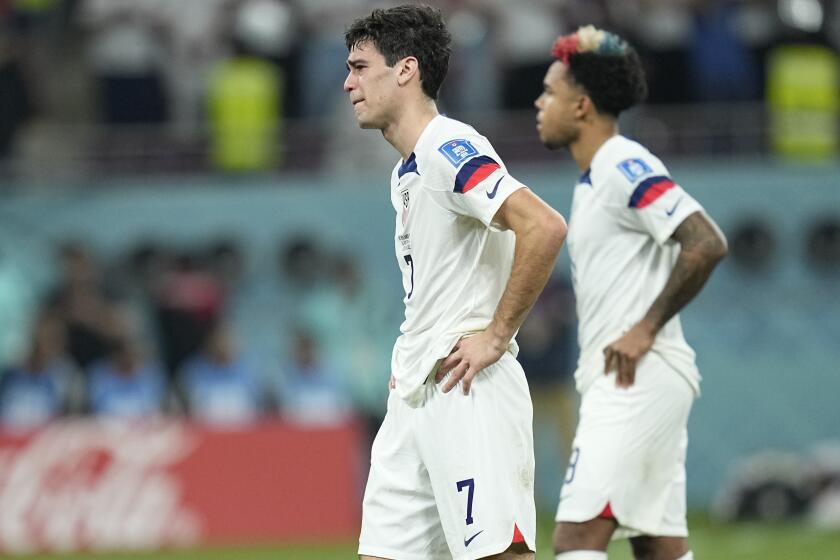Column: USMNT must demonstrate it is invested in Alejandro Zendejas’ future

In the wake of the Soccer Mom Scandal that continues to be a major source of embarrassment, this was a victory U.S. Soccer desperately needed.
Alejandro Zendejas was in camp with the men’s national team this week in Los Angeles.
Zendejas, 24, is a star.
If he is not one of the best players in North America, he is certainly one of the most famous, a signature player on one of Mexico’s signature teams, Club América.
A shifty left-footed attacker courted both by the country of his birth and the country in which he was raised, Zendejas had previously played two games for Mexico while technically still a U.S. player under FIFA rules.
Expected to make his U.S. senior national team debut Wednesday night against Serbia at recently renamed BMO Stadium, Zendejas was suddenly a symbol of the Mexican federation’s dysfunction.
Then he opened his mouth, revealing his participation in the United States’ January camp wasn’t necessarily indicative of his long-term plans.
Jalen Neal, a 19-year-old defender for the Galaxy, could earn his first cap with the U.S. national team Wednesday against Serbia at BMO Stadium.
Speaking after the team’s training session Tuesday, Zendejas was noncommittal about his international future beyond the upcoming match.
“I’m enjoying the moment, taking the opportunity that I have this week,” he said. “I have my mind focused on tomorrow’s game.”
He repeated the phrase over and over, in English and in Spanish.
He didn’t say his future was with Mexico, but he didn’t say it wasn’t either.
And who could blame him?
Mexico was eliminated in the group stage of the World Cup and its federation is a mess, but the U.S. team has its own problems.
Like the Mexicans, the Americans don’t have a coach and they don’t have direction.
How can Zendejas commit his future to a program that doesn’t know where it’s headed?
The Mexican-born and Texas-raised Zendejas is considered by FIFA to be a U.S. player because he represented the country at the U-17 World Cup in 2015.
Though Zendejas turned professional with FC Dallas of Major League Soccer, he became established in Mexico’s Liga MX. He played for Mexico at the U-23 and senior levels but did so without filing the necessary paperwork, resulting in forfeits and fines for El Tri.

Ironically, because he never filed for a one-time switch in affiliation to play for Mexico, he remains eligible to do so as long as he doesn’t play in an official match. The United States’ game against Serbia is an exhibition and therefore won’t count.
Asked whether he would be open to playing in Nations League and Gold Cup games later this year that would permanently tie him to the U.S., Zendejas replied: “Hopefully, tomorrow will be a great game for the whole team. Hopefully, get that win, and then on a personal level, I hope it’s a great game for me, and then I’ll probably focus on the future once we get to that standpoint again.”
To repeat: Who could blame him?
Interim coach Anthony Hudson said Zendejas’ recruitment was initiated last year by Gregg Berhalter, who coached the United States at the World Cup.
However, Berhalter probably won’t return as coach, as his decision to sit Gio Reyna resulted in a “Game of Thrones”-like feud with Reyna’s parents that has wrecked the program.
And even if Berhalter returns, does Zendejas want to play for the same bozo who benched a world-class talent in Reyna in favor of a glorified worker bee like Tim Weah?
What if the United States miraculously lands Jose Mourinho or some other foreign pragmatist who values an attacker’s defensive work rate over creativity?
As it stands, the diminutive Zendejas would already be competing for playing time with a group of wingers that includes Reyna, Weah and Christian Pulisic, his former youth national team roommate.
Say Zendejas beats out Reyna for a place in the team’s starting 11. Who is to say Reyna’s parents won’t try to sabotage him the way they did Berhalter?
Gio Reyna has continued to act immature in the weeks following the World Cup. U.S. Soccer should not reward him.
In this case, Zendejas might as well take a wait-and-see approach. He has only one career. He should know where he’s taking his next step.
This alone is an indictment on American soccer culture, as Zendejas’ decision should be as easy as a tap-in from inside the six-yard box.
The U.S.-Mexico rivalry is cyclical, dominated by one team over a certain period, controlled by the other in the next. The Americans are now on top. They have the better talent.
That advantage has been diminished by the events of the last couple of months.
Mexican soccer might be an active dumpster fire, but the United States has to demonstrate its self-destructive tendencies won’t land it in the same place.










